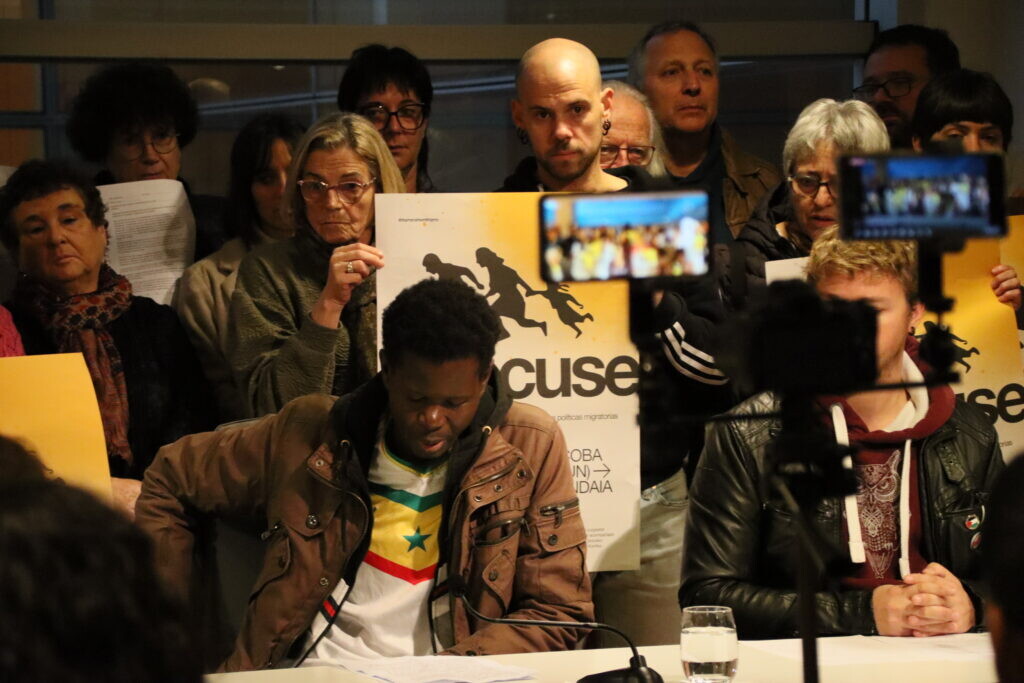"It's important to create a society that leaves room for life."
- The work of the sociologist Marina Sagastizabal (1989) brings together the concerns of the street and academic research. Why is the presence of women reduced in the most formal areas of political participation as their lifecycle progresses? Sagastizabal highlights one of the keys: the distribution of time.

You're talking about a "triple presence" in your work. What do you mean?
This triple presence encompasses domestic and care tasks, employment and socio-political participation. I have analyzed how these three are combined in everyday life, as the objective of the thesis is to see the possibilities, obstacles and strategies that exist in daily life to achieve it.
This distribution of presences is closely linked to the distribution of time.
I have analyzed the distribution of time in two aspects: quantitative, through surveys and qualitative. The approach of the triple presence has to do with the studies of some Italian sociologists who speak of a double presence. In other words, the presence of women has increased in the labour market, but they have not ceased to be protagonists of domestic and care tasks. Two tasks are carried out on a day-to-day basis, and that is not a mere sum of work, as they must be coordinated and managed. They have to move from one area to another, and that creates discomfort, they don't have time for anything else.
Since the Industrial Revolution, research has been placed in the next stage.
Yes, but especially in the post-World War II period and in the Mediterranean countries. The Basque Country is also in this context, in the set of places with reduced welfare services and very familiar. Care policies have hardly been developed in these areas, given that it is assumed that there is a family – especially women – that is dedicated to carrying out these tasks in exchange for money. Interesting is the bill that was drafted in Italy in the 1980s, the first step in the politics of time.
What was it about?
Conciliation policies were criticised and the time of life was talked about. Our society is organised around the labour market and that means that there is no time for anything else. Care and housework are not contemplated, but neither is the time for socio-political participation. They stressed the importance of creating a society that leaves time for life, so that the core of our lives is not the labour market and so that our lives are not organised according to the labour market.
Why is it important that Eustat, for example, gathers that time distribution?
The Eustat time budget surveys were carried out between 1993 and 2013 and proved to be useful in making the sphere of home and care visible. In times of economic crisis, for example, it is observed that at the social level the domestic sphere is given more time and that our well-being comes to a greater extent since it occurs in the domestic sphere than from the labour market. On the contrary, the labour market has much more weight in our imaginaries. One of the major limitations of these surveys is that the conception of time they use is hegemonic, the simple sum. It is about quantity, not quality, and that is very important in the area of care.
You have used the expression “The Worker Mushroom” and feminism uses it. What do you mean?
It's a concept that feminist economists like Amaia Pérez Orozco use. He says that the worker who leaves the labour market every day is a “mushroom worker”, with full availability. Every day she wakes up with all the needs: food, clean, flat clothes, psychological security… Everything is guaranteed and she has no responsibility to do all these jobs. She has another person at home, a woman who guarantees her all her needs with that willingness to be able to work in the labor market. It is an indispensable figure for capitalism.
Women have also wanted to be mushrooms.
Yes, it's the marriage between capitalism and patriarchy, and the system leads us to reproduce it. Everybody has to copy these models. Furthermore, when I look at socio-political participation, I have seen that in this area too the militant mushroom is the protagonist. Normally a man, with the same pattern: he has all the availability to participate in politics, to be in all meetings… Why? Because he has another person guaranteeing other needs.
In these areas there are coping strategies, such as childcare.
Yes, but in the end the model is the same. And in general, men have been the protagonists in the most masculinized or formal areas, largely thanks to this availability. And along with the militant mushrooms, I have found the figure of the bad mother: those who have not emerged from the sociopolitical participation with responsibilities in the care work, the protagonists of this triple presence, to a large extent. They've made a lot of progress, because there's still a lot of stigma for women. It encourages all its environments not to participate in the socio-political sphere, both the partner, the family, the friends, as well as the sons and daughters. They have to make a major self-affirmation effort to deal with stigma and feelings of guilt. There are children who convey to these mothers a feeling of abandonment, they do not understand why their mother is not, why she is in the assemblies and comes so late at night. The same is not true when what is missing is the father. This shows the legitimacy of the figure of the militant mushroom in the case of men.
“Elkarrizketa sakona egin diet hainbat profiletako hamalau pertsonari, zaintza-esparruan ardura maila desberdinak dituztenei, hiru ibilbide kontuan hartuta: parte-hartze soziopolitikoarena, lan merkatuarena eta zaintza-lanarena. Hiru horien artikulazioa izan da lanaren ardatza, parte-hartzea era zabalean ulertuta. Maiz parte-hartzean pentsatzen dugunean eremu formalenetan geratzen gara, ikusgarrienetan. Horrek eramaten gaitu esatera emakumeok gutxiago parte hartzen dugula, edo ez gaudela parte-hartze soziopolitikoaren eremuetan, baina begirada zabaldu behar da. Askotan, hain politikotzat hartzen ez ditugun eremuetan daude emakumeak. Eremu informalagoak dira, ezkutuko lanekin zerikusia dutenak, zaintzari lotuak, eguneroko bizitzari: guraso elkarteak, auzo elkarteak... Bi eremuak dira garrantzitsuak, formalak eta informalak”.
It is not an easy task to define what the new US mandate will bring in the economic sphere. The axis of the new economic strategy will be the peculiar union between liberalism and protectionism for the external sector. Despite what has happened in the United States on a regular... [+]
The evolution that the Internet has taken over the last 15 years, together with its technological and business model, makes us think that it is a tool to increase the worst aspects of humanity. Around the world, agents have been created that are not satisfied with this idea... [+]























